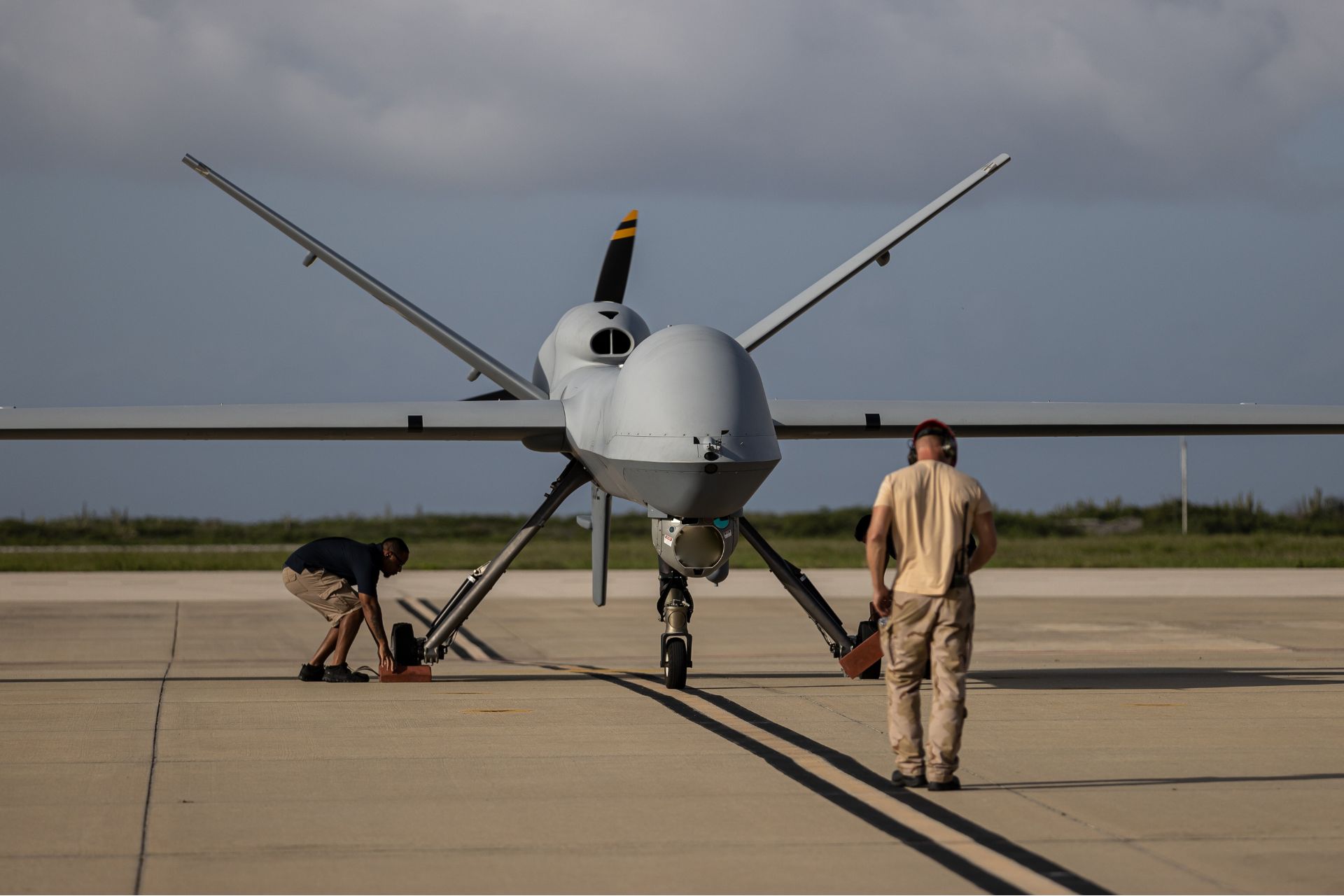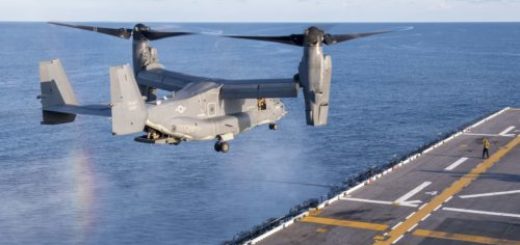Dutch MQ-9 Reaper Drones to Continue Guarding NATO’s Eastern Flank Against Emerging Threats Until 2026

{loadposition bannertop}
{loadposition sidebarpub}
The Netherlands has decided to extend the mission of its MQ-9 Reaper drones operating from Romania for another year, reinforcing its contribution to surveillance and defense efforts on NATO’s eastern flank. These unarmed drones play a key role in intelligence gathering and aerial monitoring of the Alliance’s eastern borders. They provide a detailed and real-time overview of the situation on the ground, supporting air protection operations aimed at The Netherlands has decided to extend the mission of its MQ-9 Reaper drones operating from Romania for another year, reinforcing its contribution to surveillance and defense efforts on NATO’s eastern flank. These unarmed drones play a key role in intelligence gathering and aerial monitoring of the Alliance’s eastern borders. They provide a detailed and real-time overview of the situation on the ground, supporting air protection operations to enhance regional security. The extended mission will now continue until March 31, 2026.
Follow Army Recognition on Google News at this link
The Netherlands currently operates four MQ-9 Reapers along with four ground stations, with plans for further expansion (Picture source: Dutch MoD)
Since their deployment in Romania, the MQ-9 Reaper drones have been part of “Air Shielding” operations, which focus on monitoring NATO airspace and borders in a context of heightened tensions in Eastern Europe. These drones offer advanced intelligence-gathering capabilities by flying at high altitudes for extended periods, enabling continuous and discreet surveillance of developments on the ground. Equipped with sophisticated sensors and high-precision observation systems, they contribute to building a detailed operational picture and detecting any suspicious movements or activities near the borders. This capability is essential for anticipating potential threats and ensuring NATO forces can respond quickly to evolving situations.Although the operation is conducted in coordination with NATO, the Dutch MQ-9 Reaper mission remains under national control. NATO shares its intelligence requirements with the Netherlands, but it is the Dutch government that decides which requests to fulfill and how to execute them. The analysis and processing of collected data also remain under Dutch authority, ensuring independent management of intelligence gathered during missions. This approach allows the Netherlands to maximize the effectiveness of its drones while maintaining a balance between its commitment to NATO and its security interests.The MQ-9 Reaper, operated by the Royal Netherlands Air Force, is a long-endurance reconnaissance drone capable of autonomous or remotely piloted operations. Designed for surveillance and intelligence missions, it is equipped with advanced sensors, including an electro-optical/infrared (EO/IR) camera and radar, enabling operations both day and night. With an endurance of up to 27 hours, the drone is controlled from ground stations in the Netherlands, primarily from Leeuwarden Air Base. The Netherlands currently operates four MQ-9 Reapers along with four ground stations, with plans for further expansion. The drone is a key asset in monitoring NATO’s eastern flank, actively contributing to Air Shielding operations from Romania.To date, the Dutch MQ-9 Reapers remain unarmed, but in May 2023, the government announced plans to acquire munitions, with full operational capability expected by 2028. Arming the drones would increase their flexibility and response time, allowing them to conduct precision strikes in addition to their intelligence-gathering role. Additional sensors have also been ordered to enhance their observation and targeting capabilities. Initially tested in the Caribbean under favorable weather conditions, the Reapers are now primarily deployed for European airspace protection. With satellite connectivity, they can be piloted from any location, ensuring continuous surveillance and strengthening the Netherlands’ defense and operational reach.The extended mission involves approximately 120 Dutch military personnel responsible for operating and supervising the drones from two locations. At Campia Turzii Air Base in Romania, around 35 personnel handle maintenance and operational readiness of the aircraft. Their presence ensures that the MQ-9 Reapers remain fully operational for surveillance missions. Meanwhile, the majority of the personnel assigned to this mission work from Leeuwarden Air Base in the Netherlands.From this remote control center, Dutch operators plan missions, pilot the drones using advanced control systems, and process intelligence data collected in flight. This setup ensures efficient task distribution and real-time operational oversight, optimizing the Reapers’ capabilities.The use of MQ-9 Reapers in NATO operations reflects the evolving role of intelligence and surveillance in modern military strategy. Their ability to conduct long-duration reconnaissance missions without exposing personnel to risk makes them a valuable tool for deterrence and regional security. By maintaining operations in Romania, the Netherlands continues to support NATO’s defensive posture amid current security challenges. This extension also aligns with efforts to enhance threat anticipation and provide actionable intelligence to military and political decision-makers within the Alliance.With the mission now extended until 2026, the Netherlands reaffirms its active role in defending NATO’s eastern flank while maintaining strategic flexibility for national security needs. This decision highlights the increasing reliance on drones in contemporary military operations and the necessity of advanced surveillance capabilities to address emerging geopolitical challenges.

{loadposition bannertop}
{loadposition sidebarpub}
The Netherlands has decided to extend the mission of its MQ-9 Reaper drones operating from Romania for another year, reinforcing its contribution to surveillance and defense efforts on NATO’s eastern flank. These unarmed drones play a key role in intelligence gathering and aerial monitoring of the Alliance’s eastern borders. They provide a detailed and real-time overview of the situation on the ground, supporting air protection operations aimed at The Netherlands has decided to extend the mission of its MQ-9 Reaper drones operating from Romania for another year, reinforcing its contribution to surveillance and defense efforts on NATO’s eastern flank. These unarmed drones play a key role in intelligence gathering and aerial monitoring of the Alliance’s eastern borders. They provide a detailed and real-time overview of the situation on the ground, supporting air protection operations to enhance regional security. The extended mission will now continue until March 31, 2026.
The Netherlands currently operates four MQ-9 Reapers along with four ground stations, with plans for further expansion (Picture source: Dutch MoD)
Since their deployment in Romania, the MQ-9 Reaper drones have been part of “Air Shielding” operations, which focus on monitoring NATO airspace and borders in a context of heightened tensions in Eastern Europe. These drones offer advanced intelligence-gathering capabilities by flying at high altitudes for extended periods, enabling continuous and discreet surveillance of developments on the ground. Equipped with sophisticated sensors and high-precision observation systems, they contribute to building a detailed operational picture and detecting any suspicious movements or activities near the borders. This capability is essential for anticipating potential threats and ensuring NATO forces can respond quickly to evolving situations.
Although the operation is conducted in coordination with NATO, the Dutch MQ-9 Reaper mission remains under national control. NATO shares its intelligence requirements with the Netherlands, but it is the Dutch government that decides which requests to fulfill and how to execute them. The analysis and processing of collected data also remain under Dutch authority, ensuring independent management of intelligence gathered during missions. This approach allows the Netherlands to maximize the effectiveness of its drones while maintaining a balance between its commitment to NATO and its security interests.
The MQ-9 Reaper, operated by the Royal Netherlands Air Force, is a long-endurance reconnaissance drone capable of autonomous or remotely piloted operations. Designed for surveillance and intelligence missions, it is equipped with advanced sensors, including an electro-optical/infrared (EO/IR) camera and radar, enabling operations both day and night. With an endurance of up to 27 hours, the drone is controlled from ground stations in the Netherlands, primarily from Leeuwarden Air Base. The Netherlands currently operates four MQ-9 Reapers along with four ground stations, with plans for further expansion. The drone is a key asset in monitoring NATO’s eastern flank, actively contributing to Air Shielding operations from Romania.
To date, the Dutch MQ-9 Reapers remain unarmed, but in May 2023, the government announced plans to acquire munitions, with full operational capability expected by 2028. Arming the drones would increase their flexibility and response time, allowing them to conduct precision strikes in addition to their intelligence-gathering role. Additional sensors have also been ordered to enhance their observation and targeting capabilities. Initially tested in the Caribbean under favorable weather conditions, the Reapers are now primarily deployed for European airspace protection. With satellite connectivity, they can be piloted from any location, ensuring continuous surveillance and strengthening the Netherlands’ defense and operational reach.
The extended mission involves approximately 120 Dutch military personnel responsible for operating and supervising the drones from two locations. At Campia Turzii Air Base in Romania, around 35 personnel handle maintenance and operational readiness of the aircraft. Their presence ensures that the MQ-9 Reapers remain fully operational for surveillance missions. Meanwhile, the majority of the personnel assigned to this mission work from Leeuwarden Air Base in the Netherlands.
From this remote control center, Dutch operators plan missions, pilot the drones using advanced control systems, and process intelligence data collected in flight. This setup ensures efficient task distribution and real-time operational oversight, optimizing the Reapers’ capabilities.
The use of MQ-9 Reapers in NATO operations reflects the evolving role of intelligence and surveillance in modern military strategy. Their ability to conduct long-duration reconnaissance missions without exposing personnel to risk makes them a valuable tool for deterrence and regional security. By maintaining operations in Romania, the Netherlands continues to support NATO’s defensive posture amid current security challenges. This extension also aligns with efforts to enhance threat anticipation and provide actionable intelligence to military and political decision-makers within the Alliance.
With the mission now extended until 2026, the Netherlands reaffirms its active role in defending NATO’s eastern flank while maintaining strategic flexibility for national security needs. This decision highlights the increasing reliance on drones in contemporary military operations and the necessity of advanced surveillance capabilities to address emerging geopolitical challenges.





